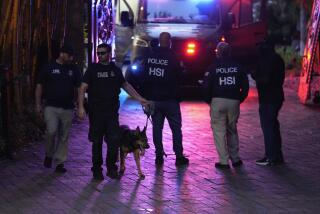FBI Agents Raid Northrop’s B-2 Bomber Plant : Defense: The search for documents is a sign that the government is stepping up its criminal probe into the Stealth program.
- Share via
Federal agents searched Northrop’s B-2 bomber plant in Pico Rivera on Feb. 15, an indication that the government has escalated a criminal investigation into the controversial $70-billion program.
A federal warrant was issued for agents to conduct the search at the Pico Rivera facility where B-2 parts are produced, Northrop spokesman Tony Cantafio said Wednesday in response to an inquiry by The Times.
Separately, Northrop reported Wednesday that it lost $63.5 million on sales of $5.2 billion last year, the result of charges that it took on a number of research and development programs. The loss included fourth-quarter red ink of $16.6 million.
The Justice Department has not disclosed the existence of a search warrant, and an FBI spokesman declined to comment Wednesday on whether a sealed warrant had been issued for the Northrop search. The department has been conducting a criminal probe for more than a year.
The federal agents took possession of some documents during the Feb. 15 search, Cantafio said, but details of what types of documents and how many of them were removed were not available.
It was not clear what prompted the agents to conduct a search for the documents, as opposed to seeking them through a grand jury subpoena.
“A raid is a drastic measure,” one knowledgeable source said. “It would not be happening 18 months into an investigation without some sort of major breakthrough or other event in the case. You can always subpoena records. You don’t conduct a raid unless you are worried the documents won’t be there when you want them.”
Northrop is the subject of several civil and criminal investigations. Last year, the company was indicted on criminal charges involving another division separate from the B-2 activities, on which a trial has just begun.
Federal authorities have been investigating civil fraud allegations on the B-2 made by current and former Northrop employees who have filed a whistle-blower lawsuit against the firm, seeking damages of $20 billion. Those allegations are believed to have prompted the criminal probe.
The original civil suit was filed in November, 1988, but it was recently amended with new allegations, prompting the Justice Department to reopen its investigation.
The allegations in the suit are that Northrop gave the government falsified progress reports on its B-2 production, false data on the amount of money it spent to perform B-2 work, mischarged labor costs, submitted false vouchers for the purchase of materials and knowingly misrepresented its progress on a key electronics system.
In addition, a source close to the investigation said Wednesday that the government is conducting a criminal probe of a B-2 navigation system Northrop is building, known as the NAS-27.
The source said the Air Force’s Office of Special Investigations is looking into why Northrop’s costs for building the system unexpectedly jumped after a relatively minor modification was ordered to the device. The NAS-27 is believed to be closely related to the MX missile guidance system, a complex $6-million device the size of a basketball.
“We are uncertain the search relates directly to our case,” said Philip Benson, an attorney who represents plaintiffs. “Our allegations are fairly sweeping and encompass a wholesale examination of the B-2.”
In its earning statement, Northrop reported a $16.6-million loss on sales of $1.33 billion, compared to a loss of $86.1 million on sales of $1.73 billion the year before.
Northrop said it took fourth-quarter charges against profit of $28 million on fixed-price defense-related programs. Of that total, $9 million was taken on a classified research and development program in its missiles and unmanned vehicles business and another $19 million on its electronics business. Most of the latter charge came as a result of overruns on its ALQ-135 electronic countermeasures system.
The company reported that its sales declined in 1989 to $5.2 billion from $5.8 billion the year before. The company also sold its headquarters building for $218 million, which it used to reduce its debt. The company will realize a pretax gain of $136 million on the sale and post a first-quarter 1990 gain of $102 million.
More to Read
Inside the business of entertainment
The Wide Shot brings you news, analysis and insights on everything from streaming wars to production — and what it all means for the future.
You may occasionally receive promotional content from the Los Angeles Times.











